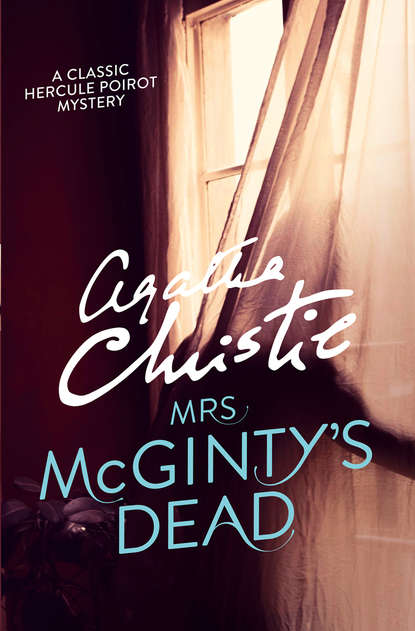По всем вопросам обращайтесь на: info@litportal.ru
(©) 2003-2025.
✖
Mrs McGinty’s Dead
Автор
Год написания книги
2019
Настройки чтения
Размер шрифта
Высота строк
Поля
‘Bad time of year. Staff hadn’t enough to do. We sacked the one who was least competent. That was Bentley. Always would be, I expect. Gave him a good reference and all that. He didn’t get another job, though. No pep. Made a bad impression on people.’
It always came back to that, Poirot thought, as he left the office. James Bentley made a bad impression on people. He took comfort in considering various murderers he had known whom most people had found full of charm.
II
‘Excuse me, do you mind if I sit down here and talk to you for a moment?’
Poirot, ensconced at a small table in the Blue Cat, looked up from the menu he was studying with a start. It was rather dark in the Blue Cat, which specialized in an old-world effect of oak and leaded panes, but the young woman who had just sat down opposite to him stood out brightly from her dark background.
She had determinedly golden hair, and was wearing an electric blue jumper suit. Moreover, Hercule Poirot was conscious of having noticed her somewhere only a short time previously.
She went on:
‘I couldn’t help, you see, hearing something of what you were saying to Mr Scuttle.’
Poirot nodded. He had realized that the partitions in the offices of Breather & Scuttle were made for convenience rather than privacy. That had not worried him, since it was chiefly publicity that he desired.
‘You were typing,’ he said, ‘to the right of the back window.’
She nodded. Her teeth shone white in an acquiescing smile. A very healthy young woman, with a full buxom figure that Poirot approved. About thirty-three or four, he judged, and by nature dark-haired, but not one to be dictated to by nature.
‘About Mr Bentley,’ she said.
‘What about Mr Bentley?’
‘Is he going to appeal? Does it mean that there’s new evidence? Oh, I’m so glad. I couldn’t—I just couldn’t believe he did it.’
Poirot’s eyebrows rose.
‘So you never thought he did it,’ he said slowly.
‘Well, not at first. I thought it must be a mistake. But then the evidence—’ She stopped.
‘Yes, the evidence,’ said Poirot.
‘There just didn’t seem anyone else who could have done it. I thought perhaps he’d gone a little mad.’
‘Did he ever seem to you a little—what shall I say—queer?’
‘Oh no. Not queer in that way. He was just shy and awkward as anyone might be. The truth was, he didn’t make the best of himself. He hadn’t confidence in himself.’
Poirot looked at her. She certainly had confidence in herself. Possibly she had enough confidence for two.
‘You liked him?’ he asked.
She flushed.
‘Yes, I did. Amy—that’s the other girl in the office—used to laugh at him and call him a drip, but I liked him very much. He was gentle and polite—and he knew a lot really. Things out of books, I mean.’
‘Ah yes, things out of books.’
‘He missed his mother. She’d been ill for years, you know. At least, not really ill, but not strong, and he’d done everything for her.’
Poirot nodded. He knew those mothers.
‘And of course she’d looked after him, too. I mean taken care of his health and his chest in winter and what he ate and all that.’
Again he nodded. He asked:
‘You and he were friends?’
‘I don’t know—not exactly. We used to talk sometimes. But after he left here, he—I—I didn’t see much of him. I wrote to him once in a friendly way, but he didn’t answer.’
Poirot said gently:
‘But you like him?’
She said rather defiantly:
‘Yes, I do…’
‘That is excellent,’ said Poirot.
His mind switched back to the day of his interview with the condemned prisoner…He saw James Bentley clearly. The mouse-coloured hair, the thin awkward body, the hands with their big knuckles and wrists, the Adam’s apple in the lean neck. He saw the furtive, embarrassed—almost sly glance. Not straightforward, not a man whose word could be trusted—a secretive, sly deceitful fellow with an ungracious, muttering way of talking…That was the impression James Bentley would give to most superficial observers. It was the impression he had given in the dock. The sort of fellow who would tell lies, and steal money, and hit an old woman over the head…
But on Superintendent Spence, who knew men, he had not made that impression. Nor on Hercule Poirot…And now here was this girl.
‘What is your name, mademoiselle?’ he asked.
‘Maude Williams. Is there anything I could do—to help?’
‘I think there is. There are people who believe, Miss Williams, that James Bentley is innocent. They are working to prove that fact. I am the person charged with that investigation, and I may tell you that I have already made considerable progress—yes, considerable progress.’
He uttered that lie without a blush. To his mind it was a very necessary lie. Someone, somewhere, had got to be made uneasy. Maude Williams would talk, and talk was like a stone in a pond, it made a ripple that went on spreading outwards.
He said: ‘You tell me that you and James Bentley talked together. He told you about his mother and his home life. Did he ever mention anyone with whom he, or perhaps his mother, was on bad terms?’
Maude Williams reflected.
‘No—not what you’d call bad terms. His mother didn’t like young women much, I gather.’
‘Mothers of devoted sons never like young women. No, I mean more than that. Some family feud, some enmity. Someone with a grudge?’
She shook her head.
‘He never mentioned anything of that kind.’
‘Did he ever speak of his landlady, Mrs McGinty?’

















